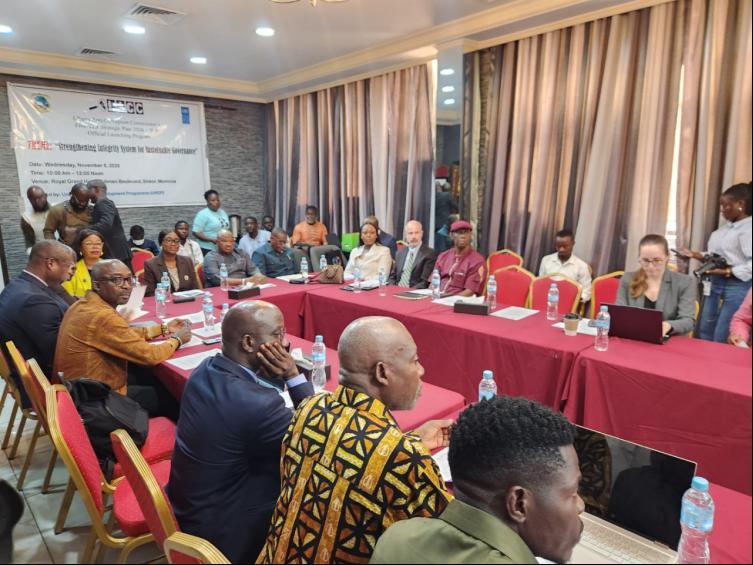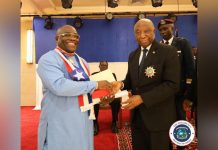Africa-Press – Liberia. As the Liberia Anti-Corruption Commission (LACC) launches a five-year strategic plan, Liberia’s Minister for State and Presidential Affair, Mr. Samuel A. Stevquoah reckons that the full achievement of Liberia’s developmental agenda – the Arrest Agenda for Inclusive Development (AAID) is heavily reliance on the shoulders of integrity and transparency.
Minister Stevquoah believes that the fundamental pillar of this government’s agenda is the delivery of tangible results for the people of Liberia.
However, this delivery, he maintains, cannot and will not be realized without absolute integrity and transparency.
The Minister of State’s assertions were contained in a statement delivered on his behalf by Prof. Augustine Konneh, Senior Advisor to the President, at the launch of the LACC five-year strategic plan in Monrovia on Wednesday, November 4, 2025.
Prof. Konneh on behalf of the Liberian government seized the occasion to assure every Liberian citizen and every development partner of its full commitment to fostering a governance environment where public trust is not merely a slogan, but a lived reality.
According to him, maintaining the integrity of government processes is essential to securing the investment, partnership, and stability necessary for sustainable national growth.
‘This is a nationalistic duty. Every resource allocated, every policy formulated, and every contract signed must withstand the brightest light of public scrutiny. The commitment to fight corruption is not an option; it is the sacred prerequisite for fulfilling our social contract with the Liberian people,’ said Dr. Konneh.
He urged public servants and officials across all branches of government as custodians of the public purse and the architects of Liberia’s future to note that the effectiveness of the LACC’s Strategic Plan ultimately rests on their shoulders, stressing that exemplary leadership is non-negotiable.
‘We must not only adhere to the law, but we must lead by example. We must demonstrate the highest ethical standards in every decision, every transaction, and every interaction. Any official found placing personal gain above the national good is not just breaking the law; they are undermining the collective effort to build a stronger, more prosperous Liberia. We must channel our energies into driving development and growth, ensuring that public funds are used efficiently and precisely where they are needed most.’
He extolled the LACC for this landmark strategic plan, which he believes are not only ambitious, but necessary and critically important to the country’s shared national objectives.
Prof. Konneh then vowed the full support of the government to the endeavor of the LACC, which he says are critical to nation building.
‘Be assured: You have the full backing and sustained support of the Presidency. We recognize that the fight against corruption is complex and demands resources, political will, and institutional protection. We stand ready to provide the necessary support to ensure this Strategic Plan achieves its objectives, reinforcing your mandate as a vital and independent body in our governance framework.’
‘Let us embrace this Strategic Plan today not as an obligation but as an opportunity to decisively secure Liberia’s future. Let us stand united in this cause for a country defined by integrity, prosperity, and national pride.’
Cllr. Alexandra K. Zoe, Executive Chairperson of the LACC, also reported some major gains at the Commission over the last few years, while at the same time setting its ambitious targets for the next five years.
In so doing, the commission reported significant progress in its ongoing efforts to combat corruption across the country with highlights of key achievements in enforcement, prevention, legal reform, and institutional strengthening.
Cllr. Zoe in an overview, revealed that the LACC has investigated and concluded 44 corruption cases, leading to 14 indictments and 4 convictions.
These outcomes, she says, reflect the LACC’s renewed focus on strengthening investigative and prosecutorial capacity in line with its strategic objectives.
The overview revealed that 91 percent of public officials complied with asset declaration requirements, with 175 verification exercises completed.
She disclosed that the Commission also launched the Citizens’ Corruption Reporting Platform (CCRP) – a digital tool that enables Liberians to anonymously report corruption cases as part of efforts to enhance transparency and citizen participation.
Through nationwide awareness programs, the LACC boss noted that the Commission engaged over 5,000 citizens, promoting integrity, accountability, and a culture of honesty in public service.
Strategic Pillars
The Commission’s anti-corruption agenda is anchored on four strategic pillars:
Enforcement: Strengthening the LACC’s capacity to investigate and enforce anti-corruption laws.
Prevention & Education: Promoting a culture of integrity through education, awareness, and preventive measures.
Legal & Prosecution: Ensuring effective prosecution of corruption cases and advocating for relevant legal reforms.
Institutional Strengthening: Building a resilient and efficient institution to drive the national anti-corruption agenda.
Targets for 2026–2030
Looking ahead, the LACC has set ambitious goals for the next five years. These include the investigation of at least 150 corruption cases, with 40 cases successfully prosecuted, and the recruitment and training of 75 new investigators and analysts to bolster operational effectiveness.
Cllr. Zoe indicates that the Commission also aims to recover up to $5 million in stolen assets, conduct 25 corruption risk assessments across government ministries and agencies, and develop modern digital systems to enhance monitoring, data management, and transparency.
She then reaffirmed the Commission’s commitment to ensuring that Liberia’s governance institutions remain accountable to the people and that the country’s anti-corruption efforts continue to yield tangible results.
Also speaking at the occasion, Dr. Anna Brzozowska, Team Leader for Governance at the European Union (EU), emphasized the need to maintain/restore trust in the country’s governance system and the Liberian society as a whole.
As she lauded the LACC for the work over the last few years coupled with the launch of the five-year strategic plan, she stated that the fight against corruption is critical to development.
‘That trust has to be rebuilt. Strong anti-corruption activities will drive more investors. Education around corruption issues is one key component of fighting corruption. Corruption is a big issue to development – it destroys the tissues of the society. The EU believes that an anti-corruption court is essential to Liberia’s development,’ she pointed out.
“We are playing an important role in the corruption fight and this is why we create specific conditions to funds we provide in budget support. Anti-Corruption is an important tool to breed development and so we want to have new types of engagement with you.’
For More News And Analysis About Liberia Follow Africa-Press






